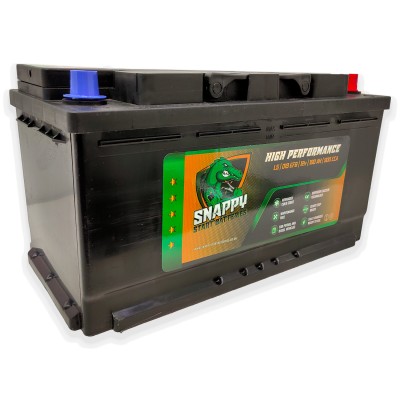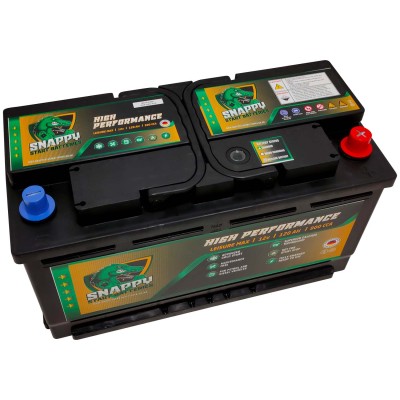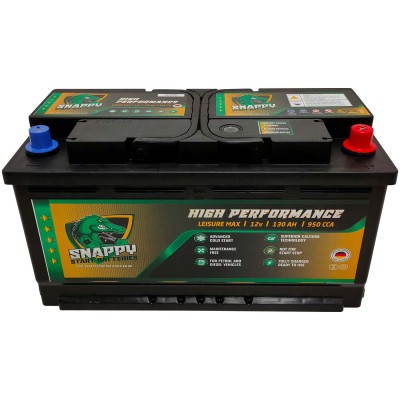Selecting the right marine batteries for your boat can feel overwhelming. One fact stands: without the right power source, your sea adventures may end sooner than expected. This guide will walk you through different battery types such as AGM, gel, and lithium iron phosphate batteries, and show how to match them with your vessel's needs.
Understanding Different Types of Marine Batteries
To know which battery suits your boat, you must learn about the different ones available. You'll find options like starting batteries for cranking engines, deep cycle types for ongoing power needs, and dual-purpose units that do both jobs.
Starting Batteries
Starting batteries are ideal for getting your boat's engine up and running swiftly. They deliver a powerful burst of electricity aimed at waking engines into action. Unlike deep cycle batteries that provide a steady flow of power over time, starting batteries focus on short, high-energy output suitable for ignition processes.
Equipped with advanced battery chemistries like AGM (Absorbed Glass Mat), these batteries promise faster charging times and resistance against common issues like overcharging and corrosion.
Coupled with chargers designed specifically for marine environments, they ensure that boat owners can depend on their vessels' electrical systems to perform when needed most. This blend of fast recharging capability and strong initial energy delivery makes them an essential part of any boater's setup, particularly those who value quick departures onto the water.
Deep Cycle Batteries
These power sources endure long, sustained draws of energy instead of short, high blasts like their counterparts.
Deep cycle variants come in several forms including flooded lead acid, lithium ions (like those found in the Topband T Series), and AGM (absorbent glass mat) technologies. They're ideal for powering equipment that needs steady electricity over extended periods - think solar panels or electric motors on boats.
The durability of deep-cycle batteries is notable. Models such as the Topband T Series Pro 12V 200Ah Lithium Battery not only provide hefty amp-hours but also feature modern enhancements such as Bluetooth and heating capabilities for optimal performance even under challenging conditions.
Dual Purpose Batteries
Dual-purpose batteries are the best choice for boat owners who need a battery that can start engines and also power gadgets. These batteries pack the punch of both starting and deep-cycle capabilities, making them versatile for various marine activities.
The Yuasa DLMC-230 Heavy Duty Dual Purpose Marine Battery at £235.45 is another high-quality option that offers reliability on water. Whether you're powering up diesel engines or keeping your lights on overnight, this battery can handle it all.
Its absorbed glass mat (AGM) technology ensures lower self-discharge rates, so it stays charged longer when not in use. With these dual-purpose batteries, sailors get peace of mind knowing their boats have the necessary power for both cranking motors and running essential electrical devices.
Factors to Consider When Choosing a Marine Battery
Picking the right marine battery means looking at how much power it can store and give out. Make sure it fits with your boat's electrical setup too.
Compatibility with the Boat's Electrical System
The right marine battery must match the electrical demands of your vessel, including its alternator and any onboard chargers. This ensures that your battery can be efficiently recharged and will supply steady power to all your boat’s devices, from navigational aids to pumps.
Conclusion
Selecting the right marine batteries for your boat ensures a smooth sail every time. From lithium to AGM types, each battery offers unique benefits suited for different needs on the water. Snappy Start guides you with expert advice and a wide range of products that match any requirement.
Make sure your sea journey is powered by the perfect energy source by picking a top-quality option from their extensive collection.
FAQs
1. What types of batteries are best for boats?
For boats, the best battery types include AGM (Absorbent Glass Mat) batteries, gel batteries, and lithium-ion batteries. Each type has its benefits like longer life or more power.
2. How do I know if a deep-cycle battery is right for my boat?
If your boat needs a lot of power for a long time, like running lights or electronic devices when the engine is off, then a deep-cycle battery is right for you. They're great because they provide steady energy over extended periods.
3. Can I use car batteries instead of marine batteries on my boat?
No, car batteries and marine batteries work differently. Marine batteries are designed to handle being jostled about in water conditions and can supply power over longer periods which makes them better suited for boats.
4. Why is it important to have the correct charger for my battery?
Using the correct charger ensures your battery charges properly without getting damaged. Overcharging or using an incompatible charger can harm your battery's lifespan and performance.
5. What should I consider when choosing between lead-acid and lithium-ion marine batteries?
Consider things like how much weight you can add to your boat (lithium-ion are lighter), how much you want to spend initially (lead-acid are usually cheaper upfront), and what kind of maintenance you're willing to do (lead-acid requires more).






















































































